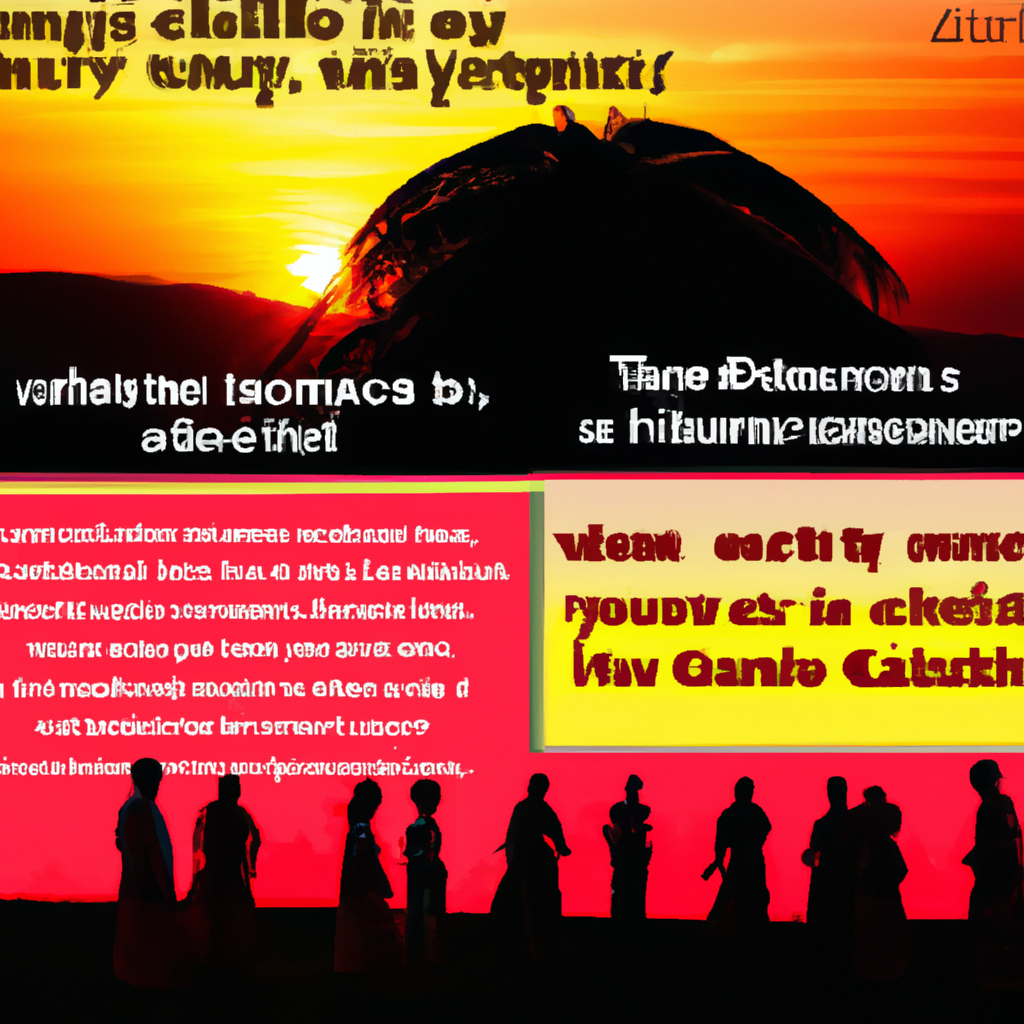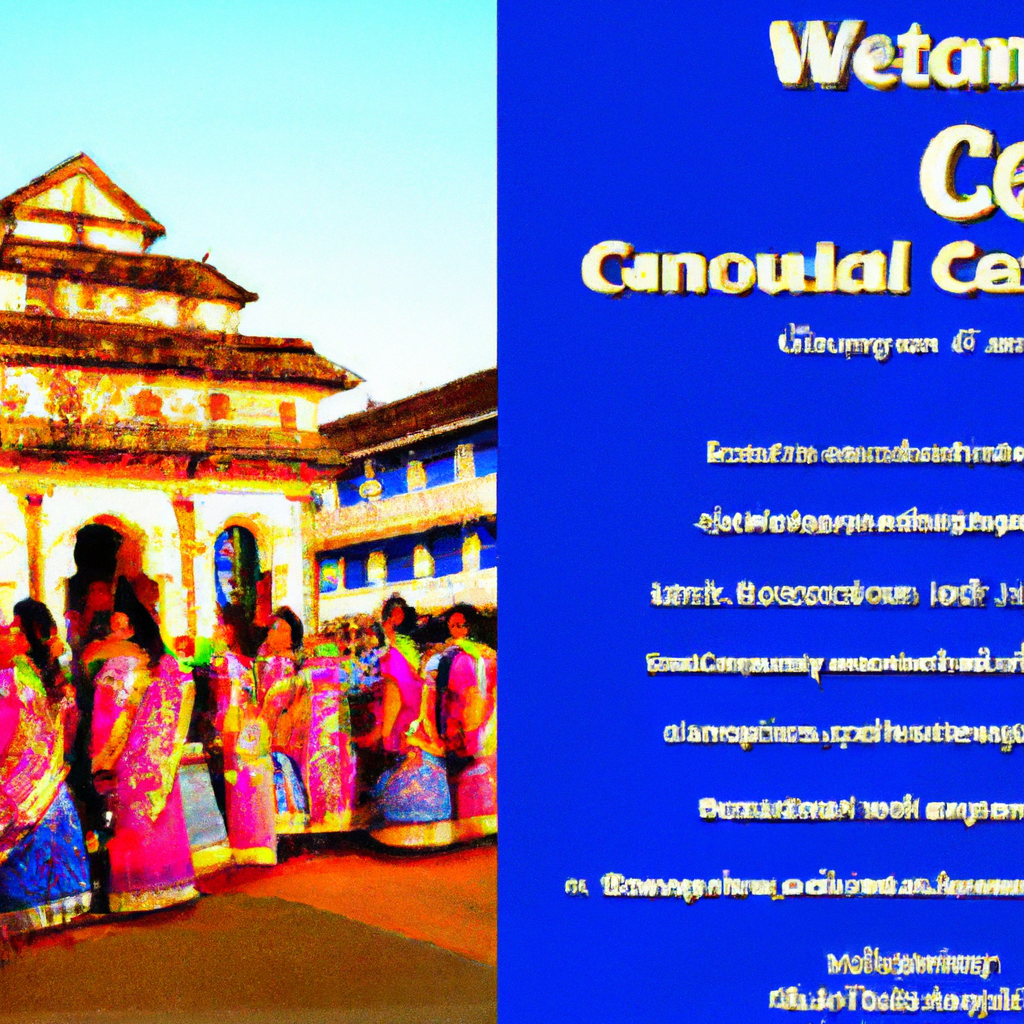
What Are The Options For Attending Local Cultural Or Religious Ceremonies?
Have you ever wanted to experience the beauty and richness of different cultures and religions firsthand? Well, there are plenty of options available to you! Whether you’re interested in attending a traditional dance performance or observing a religious ceremony, there are various avenues to explore. From joining community organizations to participating in cultural festivals, there are countless ways to immerse yourself in the local traditions and customs. So, why not step out of your comfort zone and embark on a cultural journey like no other?

1. Attend Religious Services
When it comes to immersing yourself in local cultural and religious experiences, one of the best ways is to attend religious services. This allows you to witness and participate in the traditions, rituals, and prayers that are central to different faiths. In doing so, you gain a deeper understanding and appreciation for the beliefs and practices of various religious communities. Here are some options for attending religious services:
1.1 Visit Local Churches
If you are curious about Christianity, visiting local churches is a great way to get a firsthand experience of the faith. Attend Sunday Mass or worship services and observe the prayers, hymns, and sermons delivered by clergymen or pastors. You can also participate in sacraments such as baptism or confirmation, if you wish. Churches often have welcoming and friendly communities that would be happy to have you join their congregations.
1.2 Attend Mosque Services
To explore the Islamic faith, attending mosque services is a wonderful opportunity. Mosques are the central place of worship for Muslims, where they gather to pray, listen to sermons, and engage in congregational rituals. It is important to dress modestly and respectfully when visiting a mosque. You can join the congregation in reciting prayers, observing the Friday prayer service, and learning about the teachings of Islam from the imam or community members.
1.3 Participate in Synagogue Services
For those interested in Judaism, participating in synagogue services offers an insightful introduction to Jewish customs and traditions. Synagogues are where Jews come together to pray, study the Torah, and celebrate religious holidays. You can attend Shabbat services on Friday evenings or Saturday mornings, listen to the reading of the Torah, and join in the joyful singing and dancing during festivals like Hanukkah or Passover.
1.4 Explore Temples
To experience Eastern religions such as Hinduism or Taoism, visiting temples is highly recommended. Temples serve as sacred spaces for worship and spiritual contemplation. When visiting a temple, you can witness various rituals, such as the lighting of incense, the offering of prayers, and the chanting of sacred texts. Take the opportunity to speak with the temple priests or knowledgeable community members to gain a deeper understanding of the beliefs and practices observed in these traditions.
1.5 Engage in Buddhist Ceremonies
In many countries, Buddhism plays a significant role in shaping the cultural and religious landscape. Attending Buddhist ceremonies allows you to witness the mindfulness practices, meditation sessions, and teachings that form the core of this tradition. You can join in chanting, participate in guided meditation, and even learn about the philosophy and principles that underpin the Buddhist faith. Buddhist monasteries and meditation centers often welcome visitors and offer introductory courses for those interested in learning more.
2. Participate in Community Festivals
Community festivals are vibrant celebrations of culture, traditions, and heritage. Attending these festivals offers a chance to witness firsthand the rich diversity and customs of different communities. Here are some options to consider:
2.1 Local Cultural Festivals
Local cultural festivals provide an immersive experience into the traditions and customs of a specific community or region. Whether it’s a celebration of music, dance, food, or art, these festivals offer a fantastic opportunity to interact with locals, taste traditional dishes, watch traditional performances, and learn more about the history and heritage of the community.
2.2 Seasonal Celebrations
Seasonal celebrations, such as harvest festivals, equinox ceremonies, or solstice rituals, are deeply rooted in many cultures around the world. These festivals honor nature, mark important milestones in the agricultural calendar, and are often accompanied by colorful parades, music, and dance performances. By participating in these festivities, you can gain a deeper appreciation for the connection between the local community and the natural cycles that sustain their way of life.
2.3 Ethnic Festivals
Ethnic festivals celebrate the unique cultural identities and heritage of specific ethnic groups. They provide an opportunity to learn about the traditions, costumes, music, and dances that are distinct to these communities. Attending ethnic festivals allows you to immerse yourself in the vibrant atmosphere and gain insight into the history, struggles, and triumphs of these diverse cultures.
2.4 Music and Dance Festivals
Music and dance are universal languages that bring people together. Music festivals showcase a range of genres and styles, from traditional folk music to contemporary compositions. Dance festivals offer a chance to witness various dance forms, from classical to modern, and learn about their cultural significance. These festivals often feature performances, workshops, and interactive sessions where you can try your hand at different dance styles or musical instruments.
2.5 Food and Cuisine Festivals
Food has a unique way of reflecting a community’s culture, history, and culinary traditions. Food and cuisine festivals provide an opportunity to taste authentic dishes, learn cooking techniques, and interact with local chefs and food artisans. These festivals often feature food stalls, cooking demonstrations, and cultural performances, creating a multisensory experience that tantalizes both the taste buds and the imagination.

3. Join Cultural Workshops and Classes
Participating in cultural workshops and classes not only allows you to acquire new skills and knowledge but also provides a platform for cross-cultural exchange and learning. Here are some options to explore:
3.1 Traditional Dance Classes
Dancing is a beautiful expression of culture and can serve as a gateway to understanding the history, stories, and symbolism behind different dance forms. Search for traditional dance classes in your local community and join a workshop where you can learn the intricate steps and graceful movements of dances from various cultures. Dancing alongside experienced teachers and fellow enthusiasts will deepen your appreciation for the expressive art form.
3.2 Music Lessons
Music is a powerful means of cultural expression and communication. Whether it’s learning to play an instrument, exploring vocal techniques, or understanding the rhythms and melodies of different musical traditions, taking music lessons is a fantastic way to immerse yourself in cultural practices. Look for local music schools, community centers, or instructors who specialize in teaching traditional instruments or vocal styles.
3.3 Cooking Workshops
Food is a gateway to understanding cultures, and participating in cooking workshops allows you to explore traditional recipes, cooking techniques, and ingredients unique to different cultures. These workshops often provide hands-on experiences, teaching you how to prepare authentic dishes under the guidance of experienced chefs or home cooks. By learning traditional cooking methods, you can gain a deeper appreciation for the flavors, spices, and techniques that make each cuisine distinct.
3.4 Arts and Crafts Classes
Arts and crafts offer a window into a culture’s aesthetics, traditions, and creativity. Joining arts and crafts classes allows you to learn from skilled artisans and create your own pieces using traditional techniques. From pottery to painting, weaving to woodcarving, these classes provide an opportunity to develop your artistic skills while also gaining knowledge about the cultural significance of different art forms.
3.5 Language and Literature Workshops
Language is a cornerstone of culture and offers a direct pathway to understanding a community’s values, history, and worldview. Enrolling in language and literature workshops facilitates cultural immersion by giving you the tools to engage with texts, stories, and conversations in different languages. These workshops often combine language lessons with discussions on literature and provide a platform to interact with native speakers and language enthusiasts.
4. Take Guided Cultural Tours
Guided cultural tours are an excellent way to explore and engage with the rich history, architecture, and customs of a specific location. Here are some options for cultural tours:
4.1 Enroll in Guided City Tours
Exploring the cultural heritage of a city through guided tours is a fascinating experience. Local guides provide insights into the historical landmarks, architectural marvels, and cultural significance of different neighborhoods. Joining a guided city tour allows you to immerse yourself in the local atmosphere while learning about the traditions, customs, and people who have shaped the city’s identity.
4.2 Cultural Heritage Tours
Cultural heritage tours focus on preserving and showcasing the tangible and intangible aspects of a community’s heritage. These tours often take you to historical sites, archaeological ruins, or traditional villages where you can learn about the customs, folklore, and craftsmanship that have shaped the local culture. Knowledgeable guides provide context and narratives that bring the heritage sites to life.
4.3 Historical Site Visits
Visiting historical sites allows you to trace the footsteps of past civilizations and gain a deeper understanding of their cultural contributions. Guided visits to ancient ruins, castles, or archaeological sites provide insights into the artistic, architectural, and technological achievements of different eras. Explore the stories behind these landmarks and engage with local experts who can offer valuable insights into their cultural significance.
4.4 Cultural Immersion Programs
Cultural immersion programs offer a comprehensive experience for those seeking an in-depth understanding of a specific culture. These programs often combine guided tours, language classes, hands-on workshops, and interactions with local communities. By living and learning alongside locals, you can gain firsthand knowledge of their day-to-day lives, traditions, and customs. Cultural immersion programs create lasting connections and foster cross-cultural understanding.
4.5 Museum and Gallery Tours
Museums and art galleries serve as repositories of a community’s cultural artifacts, showcasing artistic expressions, historical artifacts, and multimedia presentations. Guided tours in museums and galleries allow you to explore the collections, learn about the stories behind the artifacts, and appreciate the artistic achievements of different periods and cultures. Look out for special exhibitions or guided tours focused on specific themes or artists that pique your interest.

5. Engage with Local Religious or Cultural Organizations
Getting involved with local religious or cultural organizations can provide a deeper sense of belonging and foster meaningful connections within a community. Here are some ways to engage:
5.1 Volunteer Opportunities
Volunteering at religious or cultural organizations is a fulfilling way to contribute to the community while gaining insights into their values and practices. Many institutions rely on dedicated volunteers to assist with various activities, such as organizing events, providing support services, or helping with community outreach programs. Volunteering offers an opportunity to connect with like-minded individuals and make a positive impact.
5.2 Attend Community Events
Religious and cultural organizations often host community events, such as festivals, conferences, or lectures. Attending these events allows you to engage with community members, listen to guest speakers or artists, and participate in discussions or workshops. These events create a sense of togetherness and provide a platform for exchanging ideas, celebrating achievements, and addressing social issues.
5.3 Join Cultural Exchange Programs
Cultural exchange programs facilitate the sharing of customs, traditions, and ideas between different communities. These programs often involve hosting international visitors or participating in exchange programs abroad. By becoming part of a cultural exchange program, you can forge connections with people from diverse backgrounds, broaden your perspective, and develop a deeper appreciation for cultural diversity.
5.4 Participate in Fundraising Events
Fundraising events organized by religious or cultural organizations are not only crucial for their sustainability but also provide opportunities to actively contribute. These events often combine entertainment, cultural performances, and community participation. By attending and supporting fundraising events, you can contribute to a worthy cause while enjoying the vibrant atmosphere and connecting with fellow attendees.
5.5 Supporting Local Initiatives
Supporting local initiatives, such as community development projects, heritage preservation efforts, or initiatives promoting intercultural dialogue, helps foster a sense of ownership and investment in the local community. Whether it’s donating to a cause, joining a campaign, or actively participating in community-led initiatives, your support can make a meaningful difference and strengthen cultural bonds within the community.
6. Attend Religious or Cultural Conferences and Seminars
Religious and cultural conferences and seminars provide platforms for intellectual discussions, interfaith dialogues, and sharing knowledge about diverse customs, beliefs, and practices. Here are some options to consider:
6.1 Local Conference Events
Local religious and cultural organizations often organize conferences or symposiums to encourage dialogue, present research, and engage in intellectual discussions about various cultural and religious topics. Attending local conference events allows you to network with scholars, researchers, and community leaders while deepening your understanding of different faiths and cultures.
6.2 Interfaith Dialogues
Interfaith dialogues bring together representatives from different religious traditions to engage in meaningful conversations, bridge understanding, and promote religious tolerance. Participating in interfaith dialogues allows you to gain insights into the shared values, common concerns, and collaborative efforts among diverse religious communities. These dialogues foster mutual respect and cooperation.
6.3 Cultural Exchange Conferences
Cultural exchange conferences provide a platform for cultural practitioners, educators, artists, and enthusiasts to share experiences, best practices, and innovative ideas in the field of cultural preservation, performance, and advocacy. By attending these conferences, you can learn about successful cultural initiatives, discover emerging talents, and explore possibilities for collaboration and knowledge-sharing.
6.4 Diversity and Inclusion Seminars
Diversity and inclusion seminars aim to promote understanding, respect, and empathy towards people from different backgrounds, abilities, and beliefs. These seminars often involve interactive workshops, panel discussions, and presentations by experts in the field. Attending these seminars can broaden your perspective, challenge biases, and equip you with the tools to create inclusive and harmonious communities.
6.5 Interdisciplinary Workshops
Interdisciplinary workshops create spaces for collaboration and innovation by bringing together individuals from various fields of expertise, such as anthropology, sociology, history, arts, or theology. These workshops explore the intersections between different disciplines and provide opportunities to delve into specific cultural or religious themes, fostering a holistic understanding of complex cultural phenomena.

7. Explore Local Libraries and Resource Centers
Local libraries and resource centers are treasure troves of information and offer valuable resources for those interested in deepening their cultural and religious knowledge. Consider exploring the following options:
7.1 Attend Literary Readings
Libraries often organize literary readings where authors and poets share their works, providing insights into cultural experiences, historical events, and personal narratives. Attending literary readings allows you to immerse yourself in the literary world while gaining a deeper appreciation for the diverse voices and perspectives within a community.
7.2 Research Cultural and Religious Books
Local libraries are excellent resources for books on diverse cultural and religious topics. By researching and reading relevant books, you can gain a comprehensive understanding of different traditions, customs, and historical contexts. Look for works written by scholars, practitioners, or community members to access authentic and nuanced perspectives on various cultural and religious practices.
7.3 Join Book Clubs and Discussion Groups
Book clubs and discussion groups provide opportunities for lively conversations about literature, cultural narratives, and religious texts. Joining a book club or discussion group focused on specific themes or authors allows you to engage with fellow enthusiasts, share perspectives, and gain deeper insights into the literary works and their cultural contexts. These groups foster intellectual growth and meaningful connections.
7.4 Access Online Archives
In addition to local libraries, online archives offer a vast collection of cultural and religious resources. Digital archives provide access to historical documents, photographs, and recordings, allowing you to explore the past, gain a deeper understanding of cultural practices, and trace the evolution of different traditions. Online archives often provide valuable context and expert commentary.
7.5 Bookstore and Shop Visits
Bookstores and specialty shops dedicated to cultural or religious products are treasure troves for those looking to expand their knowledge and immerse themselves in different traditions. Explore locally owned bookstores, fair trade shops, or cultural boutiques that offer books, artifacts, music, or artworks unique to various cultures. Engage with the knowledgeable staff who can provide insights and recommendations.
8. Engage in Volunteer Work
Engaging in volunteer work provides an opportunity to actively contribute to cultural preservation, community development, and fostering intercultural understanding. Here are some options to consider:
8.1 Assist at Religious Institutions
Religious institutions often rely on volunteers to support their day-to-day operations. By offering your assistance, you can help with tasks such as organizing events, maintaining the premises, or providing support services to community members. Volunteering at religious institutions allows you to engage with the community, learn about their values, and make a positive impact.
8.2 Support Festivals and Events
Local festivals and events require dedicated volunteers to ensure their success. By supporting these events, you contribute to the preservation and promotion of cultural traditions. Whether it’s assisting with logistics, providing hospitality to attendees, or helping with artistic performances, volunteering at festivals and events allows you to actively participate while gaining insights into the cultural heritage of the community.
8.3 Work with Community Centers
Community centers play a vital role in providing social support, educational programs, and cultural activities to diverse populations. By volunteering at community centers, you can engage with community members, offer your skills in areas such as teaching, mentoring, or organizing workshops, and contribute to building stronger, more inclusive communities.
8.4 Aid in Cultural Preservation
Preserving cultural heritage requires dedicated efforts to document, conserve, and promote traditional practices. Volunteering for organizations involved in cultural preservation allows you to engage in activities such as archiving, digitizing historical records, assisting with restoration projects, or supporting initiatives to revitalize traditional crafts. Your involvement contributes to the safeguarding and transmission of cultural knowledge to future generations.
8.5 Offer Translation Services
Translation services are invaluable in bridging language barriers and facilitating communication between different cultural and linguistic communities. If you are proficient in multiple languages, offering your translation skills on a volunteer basis can support individuals or organizations in need of language assistance. This volunteer work helps foster cross-cultural understanding and inclusivity.

9. Connect with Cultural or Religious Representatives
Connecting with cultural or religious representatives offers a unique opportunity to learn directly from experts, leaders, and practitioners. Here are some ways to establish connections:
9.1 Arrange Meetings with Religious Leaders
Arranging meetings with religious leaders or spiritual guides allows you to gain personal insights into the beliefs, values, and practices of the community they represent. Engaging in conversations with these leaders provides an opportunity to seek guidance, ask questions, and learn firsthand about the rituals, ceremonies, and teachings of a particular faith. Contact the local religious institutions to arrange a meeting or request guidance.
9.2 Attend Cultural Talks and Lectures
Cultural talks and lectures often feature renowned scholars, artists, or experts who share their knowledge and insights on various cultural or religious topics. Attending these events allows you to listen to captivating presentations, engage in thought-provoking discussions, and learn from individuals who have dedicated their lives to studying and promoting cultural understanding.
9.3 Interact with Artists and Performers
Artists and performers play a pivotal role in the preservation and dissemination of cultural traditions. Attending cultural performances, art exhibitions, or music concerts provides an opportunity to interact with the artists and performers directly. Engage in conversations, ask about their creative process, and gain insights into the significance of their art forms within their cultural contexts.
9.4 Seek Mentorship Programs
Mentorship programs offer personalized guidance and opportunities for learning from experienced individuals within a specific cultural or religious field. These programs connect beginners with seasoned practitioners, allowing for mentorship, skill development, and the sharing of knowledge. Seek out mentorship programs or apprenticeships that align with your interests and aspirations.
9.5 Learn from Elders and Traditions
Elders within a community hold a wealth of knowledge and wisdom passed down through generations. Taking the initiative to connect with and learn from elders provides a unique opportunity to deepen your understanding of cultural practices, traditional customs, and historical events. Engage in conversations, listen attentively, and seek their guidance to gain insights into the traditions and heritage of the community.
10. Utilize Online and Social Media Platforms
Online and social media platforms have become powerful tools for connecting individuals interested in cultural and religious exploration. Here are some ways to utilize these platforms:
10.1 Join Online Religious or Cultural Communities
Joining online religious or cultural communities allows you to connect with like-minded individuals from around the world who share your interests. Online communities provide platforms for discussions, information sharing, and networking. Engage in conversations, ask questions, and contribute to discussions to broaden your perspectives and learn from individuals with diverse backgrounds.
10.2 Explore Virtual Ceremonies and Performances
In the digital age, many religious and cultural communities have embraced technology to offer virtual ceremonies, rituals, and performances. Exploring virtual platforms allows you to witness and engage in religious or cultural practices from the comfort of your own home. Seek out online platforms or websites that offer live-streamed or pre-recorded ceremonies, ensuring you respect the privacy and sacredness of the practices.
10.3 Participate in Webinars and Live Streams
Webinars and live streams provide opportunities to learn from experts, scholars, or practitioners in different fields of cultural or religious studies. These online sessions often include presentations, Q&A sessions, and interactive discussions. Participating in webinars and live streams expands your knowledge base, allows for professional development, and keeps you up-to-date with current topics and trends.
10.4 Follow Influential Cultural Figures
Social media platforms allow you to follow influential figures within the cultural and religious spheres. Artists, authors, scholars, religious leaders, and activists often share valuable insights, updates about events, and thought-provoking content relevant to their fields. Following these figures on social media provides a convenient way to access their knowledge, stay informed, and engage in discussions.
10.5 Engage in Social Media Discussions
Engaging in social media discussions on topics related to culture and religion encourages dialogue, the exchange of ideas, and the exploration of diverse viewpoints. Participate in respectful conversations, share your experiences, and learn from others. Social media platforms offer an accessible space to connect with individuals who share your passion for cultural and religious exploration.
In conclusion, attending local cultural and religious ceremonies opens up a world of diverse experiences and deepens your understanding of different traditions. By visiting churches, mosques, synagogues, and temples, participating in community festivals, joining cultural workshops and classes, taking guided cultural tours, engaging with local religious or cultural organizations, attending conferences and seminars, exploring libraries and resource centers, engaging in volunteer work, connecting with cultural or religious representatives, and utilizing online platforms, you can embark on a journey of cross-cultural exploration and appreciation. Embrace the opportunity to learn, connect, and celebrate the rich tapestry of human cultures and religions that exist within your own community and beyond.




